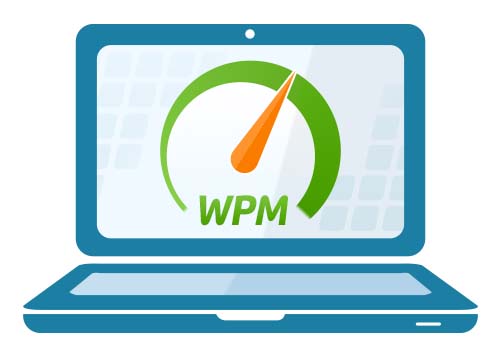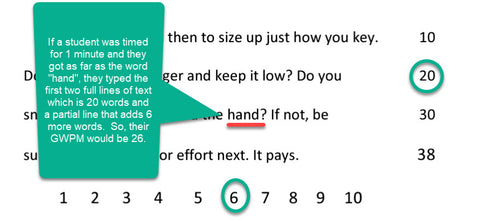
It’s nice that online typing programs and typing tests used in today’s keyboarding classrooms will automatically calculate students WPM. But, it’s also important (and fun!) to teach students how the numbers are calculated and what they mean.
Calculating WPM Activity
Ask your students to complete the following timings in word processing software such as Word or Google Docs. Set a timer for the allotted time. When finished, ask students to print their timing so they can circle errors and calculate GWPM, NWPM, and Accuracy % directly on their paper.
- Timed Writing #1
- Timed Writing #2
- Timed Writing #3
- Timed Writing #4
- Timed Writing #5
- Timed Writing #6
Instructions for Using the Timed Writing Links Above: When you open one of the “old school” Timed Writing documents found above you will notice that there are numbers running across the bottom and down the right hand side of the document. These numbers are used to manually figure out how many total words were typed in the tested time (1 minute, 2 minutes, etc.) Numbers on the right hand side of the page indicate how many words were typed if the entire line was completed. Numbers on the bottom of the page indicate the number of words typed if a line is partially completed.

GWPM (Gross Words Per Minute) is a calculation of exactly how fast someone types with no error penalties. The gross typing speed is calculated by taking all words typed and dividing by the time it took to type the words in minutes. A "word" is equivalent to five keystrokes (including spaces, numbers, letters, and punctuation marks).
To give an example: if you typed 300 characters in 2 minutes, your GWPM typing speed would be (300 characters / 5) / 2 min = 30 WPM.
Net WPM calculation is preferred for measuring typing speed as opposed to the Gross WPM computation since including mistakes will give a more complete picture of the true typing abilities of a student.
Net WPM is arguably the most useful tool in gauging typing abilities. Since errors play a part in its calculation, it is more a measure of typing productivity than of just typing speed. This makes sense because proof-reading and correcting errors takes up more time than simply typing a passage correctly in the first place. Fewer mistakes also means less chance for errors being missed during proof-reading and making their way into the final product.
The formula for calculating Net WPM is: GWPM - Number of Errors / Time in Minutes.
To give an example: if your Gross WPM on a 1 minute timed writing was 30 and you had 3 errors, your Net WPM would be 27.
Typing accuracy is defined as the percentage of correct keystrokes out of the total keystrokes typed or, it can be thought of a percentage ratio of Gross and Net WPM.
To give an example: Accuracy = (Net WPM / Gross WPM ) * 100. If your NWPM was 37 and your GWPM was 40, the formula would look like this: 37 / 40 * 100 = 92.5 %.
Sources: Typing.com, Speedtypingonline.com, TypingTest.com, and Schools.Utah.gov
**Use the KeyMaster Learning Lights Keyboard to compliment these keyboarding activities.



1 comment
Hi keymasterkeyboarding.com admin, You always provide clear explanations and step-by-step instructions.